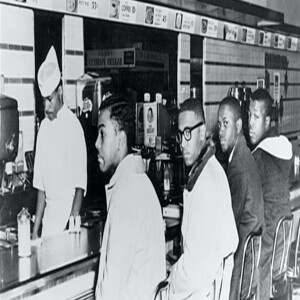
CrossWalk Community Church Napa
Religion & Spirituality

College freshman David Richmond, Franklin McCain, Ezell A. Blair Jr., and Joseph McNeil sat down to share a cup of coffee and a doughnut together. It was February 1, 1960. The store was a Woolworth’s Store in Greensboro, North Carolina – sort of like a large CVS with a Buttercream Bakery alongside (for Napans too young to know what a Woolworth’s was). They did not get served. Because they were black. Woolworth’s was happy to sell them goods in the store but refused to serve them food. This was nearly a century after the US passed the 13th Amendment forbidding slavery in our land and territories. This led to many other people in many other cities to do the same, a nonviolent form of resistance drawing attention to the obvious difference in the treatment of blacks and whites. All lot of meaning wrapped around four friends out to get a bite to eat.
Meals shared by Jesus followers are more than they may first appear. Why are they even mentioned – ever stop to think about that? It turns out that a lot of action took place around the supper table – more than just the eating. Significant events that informed the earliest Jesus followers. Events that they would remember every time they came together as a community of faith. Here are some of the meals that they would recount, and in their remembering, they would be renewed in their understanding of what it meant to be a disciple – each a form of resistance to the status quo, each a practice of the better which is the best way to critique what needs to change.
· The wedding at Cana reminded them that Jesus was proclaiming that the Kingdom of God was at hand, and that it offered an abundance of life and joy and promise and celebration for all who embraced it. This was a resistance against Rome as the bearer of Good News and hope for the future.
· Remembering the shared drink between Jesus and the Samaritan woman at the well brought radical inclusion to mind – of people and various theological beliefs. True worshipers worship in spirit and truth. It reinforced the idea that there is living water that refreshes us and never runs out – the spirit of God. This was a drink of resistance against all the discrimination and hatred that had been building, and instead a choice to live in unity.
· The feeding of the 5,000 reminded them that the humble witness of one who was willing to sacrifice what he had – a young boy with a sack lunch – could inspire thousands to share what they had so that nobody went hungry that day. Right after that, Jesus said I Am the bread of life – was he talking about God, his way of life, or both? That’s some good dinner discussion. This was a resistance to the fear-driven scarcity mindset and trust love and generosity instead.
· One evening Jesus dined with some uptight religious leaders when a known immoral woman fell at his feet, weeping, and washed Jesus’ feet with her tears and hair. Jesus was criticized by his hosts. Jesus turned the table on them, celebrating her hospitality. Then he announced to her that her sings were forgiven. This was a resistance to transactional thinking, an embrace of radical, transformative grace.
· How could they forget the dinner with Lazarus? He was dead and entombed just days before, and now he’s eating with the gang because Jesus called him forth! Lazarus’ sister, Mary, anointed Jesus with extremely expensive perfume – likely her dowry – an unwitting gift that would stay with him through his arrest, torture, and death. This was a resistance toward death itself, accompanied by an act of radical generosity.
· During his last supper with his closest followers, Jesus washed everyone’s feet, reminding them of the chief principle of the way of God: selfless service. This would be exemplified even more on the cross, which Jesus silently endured as a statement of nonviolent protest in the face of political and religious power. This weak way of God would challenge the worldview of all who understood it. This was a resistance to the way the world thinks of power. The Way views selfless service as the marker of true power.
· After Easter, Jesus cooked breakfast on the beach while the disciples were out fishing. The reinstatement of Peter to the fold – and act of forgiveness and redemption – reminded all who knew of it that grace is always available, and that the reinstatement was an invitation back to the way of selfless service, not a promotion to hold power over others. This was a resistance against cancel culture and an embrace of a grace that is honest and restorative.
When the meal shared with the faith community did its work, it resulted in a deepening love and respect for God, each other, and others. This was an act of resistance against the normal social order that valued, promoted, and perpetuated classism. Everybody was welcome around the same table among the people of The Way. Rich and poor together – crazy. And yet, even the church in Corinth, founded by Paul, felt the power of the Change Back Attacks (Martha Beck), and needed to be corrected. Selfishness was an issue. Wealthier arrived to the shared meal earlier and ate and drank to the extent that the poorer members who arrived later found nothing to eat or drink. This goes against the core meaning of proclaiming the Lord’s death until he comes, which is to remember that Jesus laid down his life in humility for those he loved – the embodiment of selflessness. Therefore, wait for each other out of love and mutual respect. To really follow Jesus means we choose selflessness, we choose to resist the cultural norms of power and position, and instead opt for a way of being that honors others as equal brothers and sisters. This is scandalous. This is the weakness of God Paul referred to that is stronger that the greatest strength of the world.
On February 1, 1960, four college freshmen took a seat at a diner’s counter for coffee and a doughnut, a nonviolent way to shine light on the fact that they were not being treated as equals in a country that prided itself on equality, that also boasted – especially at that time in our history – as a nation founded on God (a reaction to the Soviet Union’s atheistic Communism). Paul would have words for Woolworth’s, for local and state politicians, for national leaders, and for pastors and Christians who had succumbed to culture instead of serving Christ. He would have applauded the four freshman and celebrated the hundreds more who followed their example. He would have done so not because he wanted to create political noise, but because he chose to live in the footsteps of Jesus, to take the weakness of God approach over the great powers of the world.
It is good to join our ancestors in the faith and rejoice that one meaning of the death of Christ is that we are forgiven and loved by God unconditionally, which frees us from much anxiety. Yet to essentially stop there is a decision to remain in spiritual infancy. Jesus was a man of deep faith in God’s love, grace, and presence. That faith led him to bold action to bring the Commonwealth of God more and more into life on earth. To follow Jesus is to choose the weakness of God, the selflessness, the attitude and action of humble service evidenced in the character of God and quite obviously in Jesus. There is much work to do! We are invited to be part of bringing more and more shalom into the world, to help our country live up to its declarations and aspirations more and more, to deepen the maturity toward a more perfect union.
Martha Beck offered an exercise that I found quite powerful from her book, The Way of Integrity. See what it does for you...
Exercise: You are the world
1. Sit with your eyes closed and picture Earth from space, a perfect sphere of blue, green, brown, and white, hanging in a pitch-dark vacuum.
2. As you look at your home planet, think about the problems and sources of suffering that seem to threaten it most.
3. Let yourself focus on something you find especially troubling. It might be racism, political corruption, poverty, climate change, cruelty to animals, war, or crime. Whatever sparks the strongest reaction in you, allow it. Don’t try to get the “right” answer, to choose what’s most virtuous or politically correct. Feel what you really feel.
4. “Zoom in” on the issue you’ve identified. Though it will be painful, really focus on what’s going wrong. Remember everything you’ve ever learned about it. Know what you really know.
5. As you let yourself feel outrage or despair about this issue, write down everything that’s wrong about it. Say what you really mean. Make a list. If necessary, continue the list on a separate sheet of paper.
The global issue that bothers me most is creating all these problems:
6. Now write down what must happen to fix this problem. You don’t need to have sophisticated answers, or even logical ones, at this point. Just say (or write) what you really mean: “People have got to stop seeing each other as inferior!” “We must not put any more garbage into the ocean!” “We’ve got to start treating animals as fellow beings, not objects!” Make another list:
Here’s what someone (or everyone) should do to fix these problems:
7. Go back to your image of Earth. Now replace that image with your own body. If you have a negative reaction to that, know that your contribution to the planet is touched by that negativity.
8. Look at the problem you’ve chosen as your area of focus. Ask yourself: Is there any way in which your treatment of yourself mirrors this problem? Here are some examples:
· You may worry about polluting the land and sea but still put a lot of toxic substances into your own body.
· You may be angry about some human beings seeing others as inferior while seeing yourself as inferior in some way.
· You may hate cruelty to animals but drive your body—an animal—to keep overworking, staying cooped up when it longs to go outside, or forcing it to do work that it hates.
· You may be distressed about poverty while “impoverishing” yourself by denying yourself things like relaxation, kindness, play, or free time.
When you think of a way you are inflicting on yourself the problem you see in the world, write it here:
Here’s how my “global issue” shows up in my own life:
FYI: Enjoy this article that speaks more into the countercultural nature of communion.
More Episodes
 2022-01-23
2022-01-23
 10
10
 2022-01-16
2022-01-16
 5
5
 2022-01-09
2022-01-09
 7
7
 2022-01-02
2022-01-02
 7
7
 2021-12-26
2021-12-26
 11
11
 2021-12-12
2021-12-12
 9
9
 2021-12-05
2021-12-05
 5
5
 2021-11-28
2021-11-28
 9
9
 2021-11-21
2021-11-21
 8
8
 2021-11-17
2021-11-17
 9
9
 2021-11-14
2021-11-14
 10
10
 2021-11-11
2021-11-11
 14
14
 2021-11-07
2021-11-07
 8
8
 2021-11-04
2021-11-04
 10
10
Create your
podcast in
minutes
- Full-featured podcast site
- Unlimited storage and bandwidth
- Comprehensive podcast stats
- Distribute to Apple Podcasts, Spotify, and more
- Make money with your podcast
It is Free
- Privacy Policy
- Cookie Policy
- Terms of Use
- Consent Preferences
- Copyright © 2015-2024 Podbean.com





